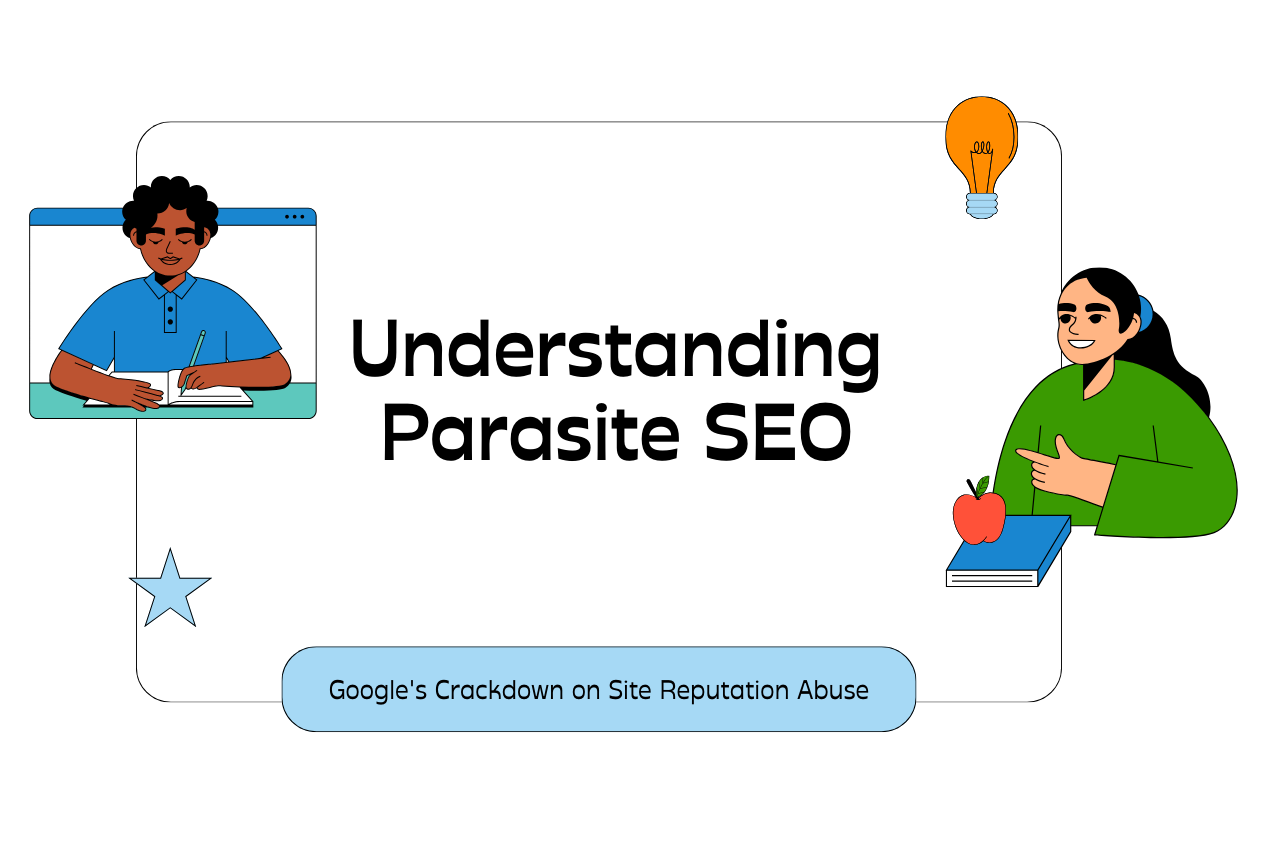Introduction
Google has recently implemented a significant update to its site reputation abuse policy, specifically targeting the unethical practice of Parasite SEO. This tactic manipulates search rankings by exploiting high-authority websites, often at the expense of user trust and content quality.
In this blog, we’ll explore what Parasite SEO entails, its implications for publishers, and how you can ensure compliance with Google’s new guidelines. Additionally, we’ll highlight the SEO benefits of avoiding such practices and maintaining a clean, ethical strategy.
What is Parasite SEO?
Parasite SEO refers to the practice of hosting third-party content on high-authority websites to unfairly boost search engine rankings. This often involves publishing irrelevant or unrelated content, leveraging the host site’s domain authority to manipulate visibility in search results.
Bonus: Technical SEO Complete Guide for Beginners
Example of Parasite SEO:
Publishing weight loss product reviews on a tech news website or posting gambling content on a health-related blog.
Why Google Flags Parasite SEO:
Even if the website owner isn’t directly involved, if the content exploits the site’s reputation to gain rankings, it violates Google’s guidelines.
SEO Benefits of Avoiding Parasite SEO:
- Protects your site’s reputation and authority.
- Avoids penalties, keeping your content indexed and visible.
- Builds trust with users and advertisers.
Google’s Stance on Parasite SEO
Google’s updated policy outlines clear distinctions between acceptable and unacceptable third-party content.
What Google Doesn’t Want to See:
- Irrelevant Affiliate Content:
- Example: Educational sites hosting payday loan reviews.
- SEO Benefit: Prevents your site from losing authority and avoids manual penalties.
- Misaligned Topics:
- Example: Health sites publishing unrelated gambling articles.
- SEO Benefit: Helps maintain topical relevance, improving your keyword rankings.
- Unrelated Advertorials:
- Example: News sites running affiliate offers unrelated to their niche.
- SEO Benefit: Keeps your site’s trustworthiness intact, attracting long-term visitors.
Potential Consequences:
- Manual penalties: Your rankings drop drastically.
- Content de-indexing: Google removes your content from search results.
Acceptable Third-Party Content According to Google
Not all third-party content is harmful. Google acknowledges several types of permissible content that, when properly managed, won’t attract penalties.
- Syndicated News Content:
Republishing news content from authoritative sources.
SEO Benefit: Adds credibility and fresh perspectives to your site. - User-Generated Content (UGC):
Forums, reviews, or comments when properly moderated.
SEO Benefit: Increases engagement, time-on-site, and user interaction. - Editorial Content:
Articles reviewed and approved by editors.
SEO Benefit: Enhances site quality and ensures relevancy. - Advertorials with Clear Disclosures:
Paid content marked transparently as advertisements.
SEO Benefit: Builds user trust and aligns with advertising guidelines.
How Publishers Should Respond
With Google planning to automate penalties for Parasite SEO, publishers must act proactively to protect their sites.
Steps to Avoid Parasite SEO:
- Audit Third-Party Content:
Regularly review third-party contributions for relevancy and quality.
SEO Benefit: Keeps your site focused on its niche, enhancing keyword performance. - Monitor Search Console:
Watch for notifications about manual penalties or de-indexed pages.
SEO Benefit: Early detection helps resolve issues before rankings are affected. - Implement Proper Oversight:
Ensure editorial guidelines are strictly followed for all published content.
SEO Benefit: Enhances your site’s authority and user trust. - Avoid Hosting Irrelevant Topics:
Reject content that doesn’t align with your site’s theme or audience.
SEO Benefit: Boosts topical authority, making your site a preferred choice for related searches.
Conclusion
Google’s crackdown on Parasite SEO is a significant step toward maintaining content authenticity and search result integrity. As a publisher, adhering to these guidelines not only helps you avoid penalties but also strengthens your site’s authority and user trust. By focusing on high-quality, relevant content, you can achieve sustainable SEO success while staying compliant with Google’s evolving policies.
Take this opportunity to review your content practices, ensure alignment with Google’s standards, and safeguard your online reputation.
FAQs About Parasite SEO
1. What is Parasite SEO?
Parasite SEO is the practice of leveraging third-party content on high-authority websites to unfairly boost rankings.
2. How does Google detect Parasite SEO?
Google uses algorithms and manual reviews to identify irrelevant or exploitative content hosted on authoritative sites.
3. What are the risks of Parasite SEO?
Risks include manual penalties, de-indexing of content, and a significant drop in rankings.
4. How can publishers avoid Parasite SEO?
Publishers should audit third-party content, maintain relevancy, and follow Google’s guidelines for acceptable practices.
5. Why is Parasite SEO bad for SEO?
It manipulates rankings, undermines content quality, and risks penalties that can harm long-term SEO performance.


